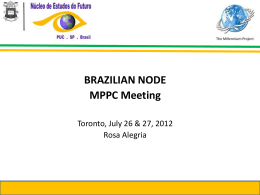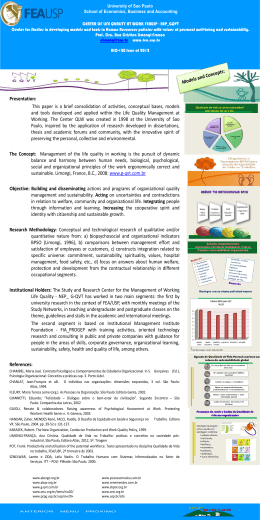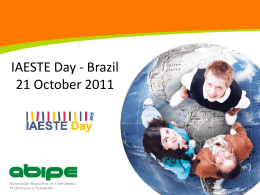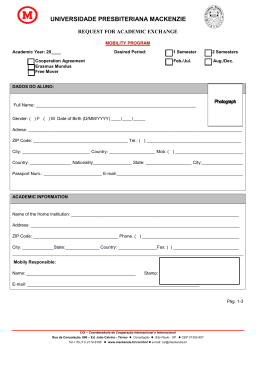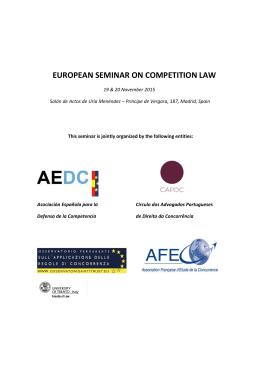3rd International Seminar on Environmental Planning and Management URBENVIRON SÃO PAULO 2008 Presbyterian University Mackenzie São Paulo – October 6 – 7, 2008 Mackenzie Global Environmental Changes Towards the 3rd Urbenviron International Congress – Seoul 2009 New Deadlines for paper submission Venue: Presbyterian University Mackenzie, São Paulo, Brazil. Coordinators: Prof. Dr. Gilda Collet Bruna and Prof. Dr. Arlindo Philippi Jr. Seminar date: October 6 – 8, 2008. 6 & 7: seminar ; 8: technical visits. • May 30: submission of full-length, 10-15 page papers, with introduction, methodology, results and conclusions, and pertinent figures, maps, tables and references. Format: Arial 12. Space 1,5. • June 30: publication of the paper selection results. • July 30: paper presentation in final version (including suggested complements). • Send your paper to: [email protected] and [email protected] • For registration, payment and proof of payment Contact [email protected] REGISTRATION NAME COMPANY FUNCTION ADDRESS ZIP CODE CITY PHONE STATE COUNTRY EXTENSION FACSIMILE EMAIL PAYMENT PARTICIPANTS UNTIL MAY 30 – R$ 250,00 PARTICIPANTS AFTER MAY 30 – R$ 300,00 STUDENTS – R$ 100,00 LATIN AMERICAN STUDENTS – R$ 50,00 URBENVIRON ASSOCIATION MEMBERS – R$ 150,00 Payment Through Identified Band Deposit In Banco Real, Agency 0565 Account 7730718-0 Proof of payment and registration must be send to [email protected] 1 3rd International Seminar on Environmental Planning and Management URBENVIRON SÃO PAULO 2008 Presbyterian University Mackenzie São Paulo – October 6 – 7, 2008 Mackenzie Global Environmental Changes Towards the 3rd Urbenviron International Congress – Seoul 2009 Background A global initiative to gather research groups, scholars, enterprises, governmental institutions and NGOs, all committed to knowledge building and networking on the subject of environmental planning and management. It started in November 2004 in Brasilia, when Catholic University of Brasilia and the Technical University of Berlin organized an International Seminar as the first URBENVIRON event. That leading action set forth the 1rst URBENVIRON International Congress on Environmental Planning and Management, held in September 2005, also in Brasilia. That event joined about 700 participants of 28 countries to discuss the Environmental Challenges of Urbanization, which included topics about the interactions among human beings and the urban environment, theory and praxis of urban environmental planning and management, and the dynamics and social environmental impacts of urbanization. The high point of the Congress was the international agreement on a declaration – THE CHARTA OF BRASILIA – with the principles of sustainable urban planning and management. It was also created the URBENVIRONET – International Network for Environmental Planning and Management. Since then, the Mackenzie University, the Universities of São Paulo, Brasilia, Rio de Janeiro, Chile, Seoul, Cairo, Umm al-Qura, La Plata, San Agustin de Arequipa and many other institutions joined the Catholic University of Brasilia and the Technical University of Berlin in the initiative, turning the URBENVIRON into a worldwide mark in the urban environmental management. The 2nd Urbenviron Congress took place in August 2007 at the Technical University of Berlin, counting with 400 participants from 44 different countries. Discussions around the theme: Planning the Urban Environment – Visions, Implementation, Results. The audience fully agreed with the creation of the URBENVION – International Association for environmental Planning and Management, and Brasilia was appointed as the Association’s headquarters. The 2nd URBENVIRON Congress also accepted the assignment of the URBENVIRON Chapters, as representatives of the URBENVIRON International Association for Environmental Planning and Management around the world, and reaffirmed the commitment to the following objectives: • Implementation of the CHARTA OF BRASILIA • Organization of WORLD CONGRESSES and INTERNATIONAL SEMINARS (biennial) • Publication of URBENVIRON Periodical and NEWSLETTERS • The running of the URBENVIRONET • Development of research projects and case studies in support to a more sustainable development all around the world. Responding to those challenges, adaptation in policies, institutional and environmental governance frameworks are required in order to create the enabling conditions for effective management of ecosystems and its services while meeting well-being goals • The 3rd Seminar São Paulo 2008 - Global Environmental Changes 2 3rd International Seminar on Environmental Planning and Management URBENVIRON SÃO PAULO 2008 Presbyterian University Mackenzie São Paulo – October 6 – 7, 2008 Mackenzie Global Environmental Changes Towards the 3rd Urbenviron International Congress – Seoul 2009 According to the Global Environment Change Program of the World Health Organization (www.who.int/globalchange/en), increasing human activity and large consumption of ecosystem services have drastically affected the local and global environment for the past 50 years. Climate change, stratospheric ozone depletion, loss of biodiversity, changes in hydrological systems and freshwater supplies, land degradation and stresses on food-producing systems are among the largest global environmental problems we face today, affecting large part of the poor population living in rural areas and large urban centers Responding to those challenges, adaptations of policies, institutional and environmental governance frameworks are required in order to enable conditions for effective management of ecosystems and its services while meeting well-being goals. To deal with such issues the 3rd URBENVIRON International Seminar on Environmental Planning and Management - São Paulo 2008 is focusing the following themes: 1. Environmental Governance and Urban Public Policy Growth and maintenance of generated wealth within urban areas, without affecting natural renewable resources have become a key factor among urban planners and public policies decision-makers. Urban green governance appears as a variety of new arrangements in order to structure collective action towards urban livability. Understanding how authorities are solving urban problems requires examining the interactions between local, regional, national, and international state and non-state actors. In the last decades Governance and Sustainability arose as important interrelated concepts in the field of development planning. Green governance, understood as the institutional dimension of sustainable development, has been widely acknowledged as one of the bottle-necks for steady changeovers. Considerations about imbalances of strength amongst the various social actors within democratic decision-making processes, as well as asymmetrical development patterns due to inequality of information accessibility, open a wide set of researches on green governance and urban public policies. Papers on this theme should discuss on-going experiments in community governance, in the context of globalization; the emergence of new institutional arrangements and legal solutions; innovative lines of thinking about urban environmental policy; sustainability indicators on urban contexts; public-private partnerships; green governance in urban areas. 2. Ethics and Socio-environmental Responsibility A new wave of concern for natural resources and respect for the environment, allied to a stronger belief in the importance of community participation has increased among business and corporations in Brazil. Companies have realized the need to uphold values of corporate socio-environmental responsibility. There is a deeper understanding about the significance of promoting policies and actions that integrate man and nature, while fomenting its benefits to local social groups. In an interdisciplinary scope, this theme deals with ethics and socio-environmental responsibility. Papers on this theme should incorporate in the discussion aspects related to environmental education; professional practice and skills training programs; ethics in the company; science and market production and consumption. 3. Built Sustainable Environment Massive and extensive human built-up artificial surroundings have been impacting urban areas like living organisms, considering the consumption of resources and disposal of wastes. Those manmade areas have also been encouraging intense concentration of industrial plants within their boundaries. The purpose of this theme is to raise discussion on built-up sustainable environments as mitigation solutions for the misuse of urban territories. Papers should focus on intervention theories and 3 3rd International Seminar on Environmental Planning and Management URBENVIRON SÃO PAULO 2008 Presbyterian University Mackenzie São Paulo – October 6 – 7, 2008 Mackenzie Global Environmental Changes Towards the 3rd Urbenviron International Congress – Seoul 2009 strategies directed to critical problems and constraints in dealing with urban waters; energy consumption and disposal; housing and urban mobility. Organizing Committee • • • • • • • • Angélica Aparecida Tanus Benatti Alvim, Presbyterian University Mackenzie Arlindo Philippi Jr., University of São Paulo (Coordinator) Carlos Leite, Presbyterian University Mackenzie Eunice Helena Sguizzardi Abascal, Presbyterian University Mackenzie Gilda Collet Bruna, Presbyterian University Mackenzie Coordinator) Nádia Somekh, Presbyterian University Mackenzie Sueli Corrêa de Faria, Catholic University of Brasilia Tadeu Fabrício Malheiros, University of São Paulo International Scientific Committee • • • • • • • • • • • • • • • • • Arlindo Philippi Jr., University of São Paulo Benamy Turkienicz, Federal University of Rio Grande do Sul Bong-Ho Han, University of Seoul Doaa El-Sherif, Government of Egypt Donald Miller, University of Washington Dora Guillen T. de Arce, University of San Agustín de Arequipa Gilda Collet Bruna, Presbyterian University Mackenzie Hartmut Kenneweg, Technical University of Berlin Hugo Romero, University of Chile Jonathan P. Deason, George Washington University Jorge Antonio Martins, Federal University of Rio de Janeiro Kala Vairavamoorth, University of Birmingham Marcela Gregori, University of La Plata Marcia Mathieu, Institut de Recherche pour le Développement Renata Marson Andrade, Catholic University of Brasilia Sueli Corrêa de Faria, Catholic University of Brasilia Vicente del Rio, California Polythecnic State University William Siembieda, California Polythecnic State University National Advisory Scientific Committee • • • • • • • • • • • Bernardo Arantes do Nascimento Teixeira, Federal University of São Carlos Carlos Eduardo Dias Comas, Federal University of Rio Grande do Sul José Ronal Moura de Santana Inez, University São Judas Luiz Guilherme Rivera de Castro, Presbyterian University Mackenzie Marcelo de Andrade Romero, University of São Paulo Maria Augusta Justi Pisani, Presbyterian University Mackenzie Maria Cecilia F. Pelicioni, University of São Paulo, Faculty of Public Health Nara Sílvia Marcondes Martins, Presbyterian University Mackenzie Petra Sanchez Sanchez, Presbyterian University Mackenzie Ricardo Siloto da Silva, Federal University of São Carlos Roberto Righi , Presbyterian University Mackenzie 4 3rd International Seminar on Environmental Planning and Management URBENVIRON SÃO PAULO 2008 Presbyterian University Mackenzie São Paulo – October 6 – 7, 2008 Mackenzie Global Environmental Changes Towards the 3rd Urbenviron International Congress – Seoul 2009 • • • • Sheila Ornstein, University of São Paulo Tadeu Fabricio Malheiros, University of São Paulo, Engineering School of São Carlos Valter Luis Caldana Junior, Presbyterian University Mackenzie Volia Regina Costa Kato, Presbyterian University Mackenzie Supporting Technical Group • • • • • • • Ana Luiza S. Spínola Krings, University of São Paulo, Faculty of Public Health Constance Jacob Melo, Mackenzie Presbyterian University Gislene Passos Ribeiro, Mackenzie Presbyterian University Juliana Di Cesare Margini Marques, University of São Paulo Paula R. Jorge Vendramini, University of São Paulo, Faculty of Public Health Rechilene Mendonça Maia, Mackenzie Presbyterian University Sibila Corral de Arêa Leão Honda, Mackenzie Presbyterian University Contact [email protected] Support 5
Download


